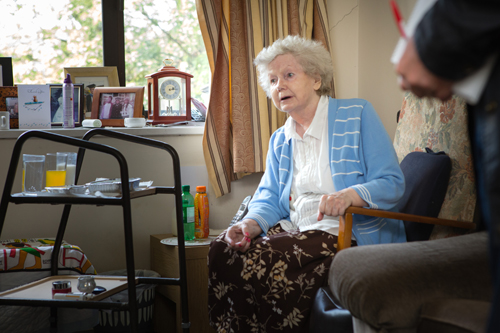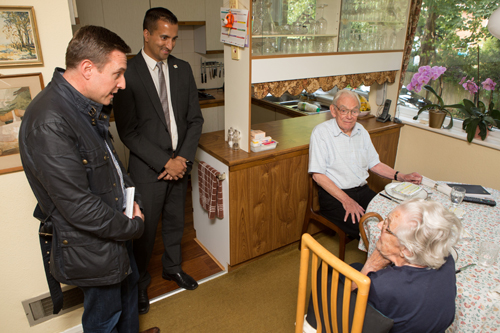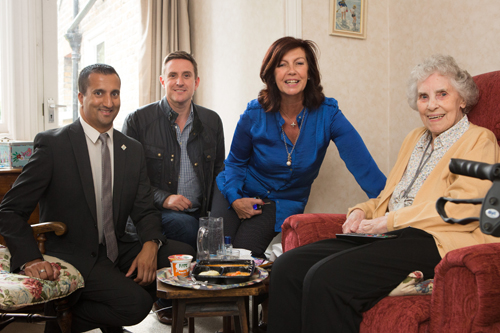Public sector focus: Meals with care
Mark Lewis goes on a round to find out more
This November, the National Association of Care Catering (NACC) will once again celebrate National Meals on Wheels Week.
Underfunded and undervalued, these are difficult times for the meals on wheels provision. With local councils under no statutory obligation to offer the service, increasing numbers of them are opting out, leaving qualification for meal delivery a postcode lottery.
The NACC reckons that a third of councils have abandoned the provision. And it's estimated that a total of two-thirds of the meals provision has disappeared in the last three years.
For local councillors struggling to stretch reduced budgets across multiple services, it's tempting to view meals on wheels as a concept out of time, superceded by the supermarket delivery van and the prevalence of ready meals, fridges and microwaves. They see their case as strengthened by the fact that uptake of meals delivery has dwindled in recent years.
But the many elderly people that still benefit from the pleasure, nutrition, independence and friendship that the meals on wheels service offers would disagree.
I should know. As a boy, I occasionally accompanied my mother on her meals on wheels rounds in Berkshire; and I witnessed first-hand how the value of the service far transcends the basic provision of food as fuel.
I recall vividly the pleasure and reassurance the folk we visited took from having a friendly face enter their home, chat with them for a little while, and leave them with a hot meal.
Thirty-five years on, I've arranged to go out on a round again, this time with the community meals service of the London borough of Redbridge, which outsources its community meals provision to cook-freeze meals provider Apetito, to see what the future holds for meals on wheels.
There's no escaping the fact that uptake has waned in recent years. Where once the council ran five central regen kitchens, now it maintains just two, where Apetito staff reheat pre-packed meals for a cohort of delivery people.
Once there were 35 daily rounds across the borough. Now there are just 12 serving 200 lunches, seven days a week.
It's a culturally diverse borough, and the availability of traditional British, halal, kosher and Caribbean dishes reflects this. Texture-modified meals are also available, providing a safe and dignified dining experience for people who find chewing or swallowing difficult.
The council applies a subsidy that's not means tested, leaving a flat rate of £4.15 for a two-course meal. (The NACC estimates the average cost in England is £3.45, though in some regions this can rise to as high as £6 to £7.) The cost to the council of maintaining the service is some £300,000 a year.
Food as medicine
Our round starts at a converted church in South Woodford, which the kitchen shares with a nursery. Our host is Vivien Rose, services manager for day opportunities and community meals in Redbridge's adult social services department.
Vivien comes from a pub catering background, but found her vocation in the community meals environment. "I loved the visiting," she says. "You could see how much people appreciated it."
There's no age limit to the service Vivien and her team provide. "You're eligible if you're struggling to prepare yourself a hot meal," she says.
"We believe in food as medicine. If you eat well, it keeps you well and you need less medical support and fewer trips to the surgery or to hospital. We offer a nutritionally balanced two-course meal and we promote hydration."
Vivien is eager to stress the benefits that come with a regular home visit. "We conduct a daily 'safe and well' check. If there's no reply at a property, we put in calls to the family until we know someone is okay. If we find someone on the floor after a fall, we call an ambulance. Maybe yesterday's meal is still uneaten? If so, we'll tell the family.
"We've also partnered with the London Fire Brigade to offer a free fire alarm installation service and with the Redbridge Bogus Caller Partnership to raise awareness of hoax callers."
On average, visitors spend three or four minutes in each house. If required, they'll remove lids, plate food or cut up meat.
"Our arrival is often the highlight of service users' days. We rarely get complaints. What price can you put on daily social contact, someone checking you're alive and well? It takes the stress off the NHS, which is on its knees."
I'm on a round with Denise, who has been delivering meals on wheels for eight years. "I thought it sounded interesting and when I did it, I loved it. I talk a lot and the job lets me talk a lot. You chat to people and happen to give them a meal in the process - it's not like a job at all."
Our first stop is at Manor Lodge sheltered accommodation, to see Mrs Kennelly. "Can I come in?" Denise shouts at Mrs Kennelly's door. "I've got my entourage with me."
Mrs Kennelly calls her meals "marvellous, good value for money and enjoyable". She particularly enjoys chicken, and fish in parsley sauce - but she misses parsnips. "I always wait for Denise and I miss her when she's away," she confides.
Mrs Kennelly
Our next stop is with Mr and Mrs White. He's 95, she is 92. "Our meals keep us going - along with having someone dropping in," says Mr White. Down the road, Mrs Lill is a feisty East Ender who enjoys a little banter with Denise, and likes beef, chicken and salads, which she eats in a chair beside her mum's old piano. On we go to Mrs Middleton, who has been looking forward to telling me how great community meals are. "The food is excellent. It arrives in good order, always hot, and the visitors are so charming. After a stay in hospital you need a little cossetting and a smile."
Our final stop is with Mrs Wiggs. She enjoys her meals too, though "the nicest part is Denise's cheery greeting".
Mark Lewis, Neel Radia, and Mr and Mrs White
Human nourishment
A pattern emerges through the course of our round: a tasty meal and the nourishment of human contact are two of life's greatest pleasures. Who knew?
The NACC's chair, Neel Radia, joins Denise and me on our round. The NACC is calling on the Government to make Meals on Wheels a statutory, rather than discretionary, service. It stresses the social, economic, psychological and preventative benefits of meals provision. And it argues the case for offering a lifeline to our more vulnerable elderly by keeping them well-nourished and independent, while helping them fend off social isolation.
By providing a nutritionally balanced meal, some social contact and ongoing health and safety checks, Radia argues, the service can help to keep the elderly at home longer and therefore reduce pressure on the NHS.
Back at the central kitchen, we meet John Powell, the director of adult social services and housing for Redbridge, and a man at the sharp end of budgetary planning. Redbridge needs to find £70m of savings in the next three years, on top of £45m already saved. (Nationwide, local authorities are being asked to find 40% in spending cuts.) It has invited residents to feed into the process of deciding where cuts should be made through its online You Choose survey.
So why are meals on wheels losing out? "It's fascinating how many people take money away from social care in the research," says Powell. "They want roads and schools - that's what most people benefit from. And they see social care, like the NHS, as a basic right. The problem for meals on wheels and residential care is that demand for both is going down."
For Lee Sheppard, the director of public policy and external affairs at Apetito, this apparent shrinkage in demand for meals on wheels uptake is a fallacy.
"It's not that people aren't asking for meals, it's that they aren't being encouraged to because of changes to the assessment criteria. Our ageing population means that more people need them than ever. Now the assessment criteria are far tighter."
Sheppard agrees with Powell that there's a perception issue. "The public assumes the provision is still there. They'd be horrified to discover it's a disappearing service.
"More local authority provision will go, but I expect it to bottom out in the coming few years and rise again in the next 10 years. Given our ageing population, in the longer term the age-old model of treatment as the first intervention simply won't work. We need to start focusing on prevention, not treatment."
Neel Radia, Mark Lewis, Vivien Rose and Mrs Wiggs
But he doesn't believe that a revival in community meals will be sparked by making them a statutory obligation.
"You can't tell local authorities to spend in a particular area," says Sheppard. "It's a question of aligning social care and healthcare spend more closely. If you invest today in one, you save tomorrow on the other."
Moreover, from scale will come efficiency. "Open up the assessment criteria," Sheppard says, "and more people will opt in. In time, you could reach a self-funding, nil-subsidy stage."
My morning in Redbridge has left me viewing spending cuts on meals on wheels as a false economy. A fast-ageing population is placing huge pressure on adult social care budgets. Allowing them to live at home should be seen as an investment, not a cost. For as many people as want it, the service should continue.
Reductions in community meals can only lead to more hospital admissions and residential care. Even when elderly people are able to remain at home, the lack of meal provision would, in many cases, lead to more spend on domiciliary care.
The NACC's ambition for a statutory obligation to provide meals in the community may remain a pipe dream. But better chains of communication at local authority level would surely highlight the link between investment into community meals and savings in residential and hospital care.
This, after all, is the front line of social care. For every person for whom a delivered meal means they can stay in their home longer, the state saves. Joined-up government? Tony Blair would approve.
My morning ends with a lunch of fish in butter sauce and apple crumble. Very tasty it is, too.













